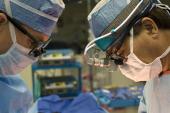Statin Loading No Help Before Bypass Surgery: StaRT-CABG
Between this trial and STICS, the question of statin loading has been resolved, Marc Ruel says: “We shouldn’t be doing that.”

Among patients who are already taking statins, giving additional doses in the hours before CABG isn’t worthwhile, the StaRT-CABG trial shows.
The 30-day rate of MACCE (a composite of all-cause mortality, MI, stroke, or TIA) was 13.9% in patients who received extra doses and 14.9% in those who received placebo, a nonsignificant difference (OR 0.93; 95% CI 0.74-1.18). There was no impact on a variety of secondary outcomes either, researchers led by Oliver Liakopoulos, MD (University Hospital Cologne, Germany), report in a study published online recently in the European Heart Journal.
“In the context of existing evidence from the STICS trial that showed no beneficial clinical effects of a preoperative statin loading in predominantly statin-naïve CABG patients, the results of the StaRT-CABG trial also do not support the routine use of an additional statin treatment among patients that are already taking statins before isolated, elective CABG,” they write.
Commenting for TCTMD, Marc Ruel, MD (University of Ottawa Heart Institute, Canada), said this was not necessarily a big question for surgeons, but added, “If one of your pressing questions was should I load someone with statins prior to surgery, on the day prior, I think the answer is clearly no. We shouldn’t be doing that.”
StaRT-CABG
Although current guidelines don’t recommend statin loading before cardiac surgery in patients who are not taking the drugs, on the basis of STICS, there had remained some uncertainty about whether the practice could be beneficial in patients already on statins, the authors say. They note that there is some evidence—from the ARMYDA-RECAPTURE trial in particular—that giving a high dose of statins before PCI is beneficial for patients already taking the medications.
The concept was tested in StaRT-CABG, which was conducted across 14 centers in Germany. Investigators randomized 2,635 patients (mean age 66 years; 14.9% women) who had been taking statins for at least 30 days to two statin-loading doses or placebo at 12 and 2 hours before isolated CABG.
There’s nothing there that suggests that you should be giving these kinds of statin doses 12 and 2 hours before surgery. Marc Ruel
The primary outcome was MACCE within 30 days of surgery, with no difference observed between the trial arms. There were no differences for any of the individual components except for stroke, which was more frequent in the statin-loading arm (1.7% vs 0.9%; P = 0.045). “This finding has not been reported in previous randomized clinical trials and to the best of our knowledge has no clear causation to the statin-loading regimen,” the investigators say.
Statin loading had no significant effect on a variety of secondary outcomes, including postoperative atrial fibrillation, length of stay, perioperative myocardial injury according to troponin T release, repeat revascularization or cardiac death/MI at 30 days, or death at 12 months.
Safety outcomes were similar in each group.
Why the Neutral Finding?
As for why these results differ from those observed in the setting of PCI in ARMYDA-RECAPTURE, Liakopoulos et al say it “might be related to the different degree of myocardial damage associated with PCI compared with CABG or the statin-loading regimen in our study that consisted of four different statins instead of a high-intensity loading with atorvastatin only.
“Our results suggest,” they continue, “that an additional statin treatment exerts only negligible or no clinical effect in patients undergoing CABG, that is much more invasive in its nature due to direct surgical trauma of the heart, the use of cardiopulmonary bypass and cardioplegic cardiac arrest, that altogether are factors associated with a greater global myocardial injury and inflammation compared with PCI where regional ischemia is frequently caused by atherosclerotic plaque embolization.”
Ruel, too, alluded to differences between the revascularization procedures, and particularly the greater importance of antiplatelet therapy in PCI, to explain the discrepant results. “It’s logical to think that there are things that will work with PCI—will be, in fact, necessary to maximize the outcomes of putting a piece of metal inside the artery—but which may not necessarily make a difference when you’re using a biologic conduit, an artery that you’re essentially transplanting from another part of the body and putting into the arterial circulation around the heart, which is a bit more biologic and a little less disturbing from a blood flow and clotting point of view,” he said.
Overall, the StaRT-CABG results confirm what surgeons suspected about the use of statin loading before CABG, Ruel said. “Certainly there’s nothing there that suggests that you should be giving these kinds of statin doses 12 and 2 hours before surgery,” he said. The difference in stroke, he added, is probably a statistical fluke, although it could be a marker of caution if any further trials in this area are pursued. “But to me there’s probably no need for a future trial. I think that particular question has been resolved.”
Islam Elgendy, MD (University of Kentucky, Lexington), agreed that the findings of StaRT-CABG don’t support statin loading before elective CABG in patients already taking statins, but, he commented via email, “patients should continue to receive their statin dose as prescribed before and after the surgery.”
He noted that guidelines don’t recommend statin loading before cardiac surgery for patients who are statin-naive based on the STICS trial, and said, “I believe that this recommendation should be extended to patients chronically on statins as well.”
Elgendy underscored the important role statins play in the chronic management of patients with CAD, including those undergoing CABG. “The findings from this trial should not be interpreted that patients undergoing CABG don’t benefit from statins, but rather they should be interpreted [to mean] a single high dose of statins prior to CABG does not add any additional benefit beyond taking the statins as prescribed,” he said.
Todd Neale is the Associate News Editor for TCTMD and a Senior Medical Journalist. He got his start in journalism at …
Read Full BioSources
Liakopoulos OJ, Kuhn EW, Hellmich M, et al. Statin loading before coronary artery bypass grafting: a randomized trial. Eur Heart J. 2023;Epub ahead of print.
Disclosures
- The trial was funded by the German Federal Ministry of Education and Research.
- Liakopoulos reports no relevant conflicts of interest.




Comments